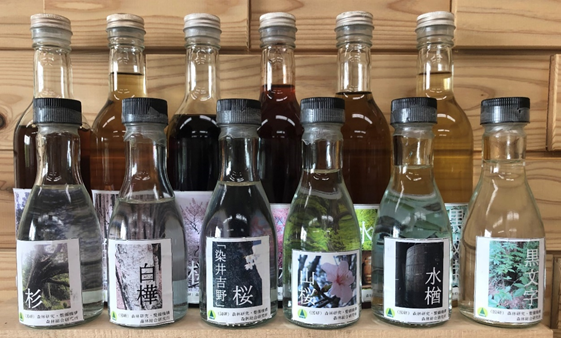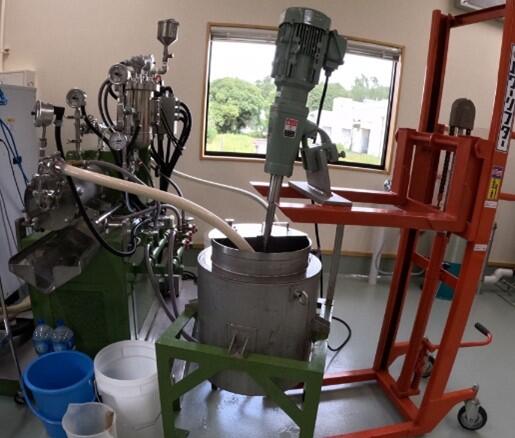(This is an English translation of the original Japanese article.
The publication date refers to that of the Japanese version,
which differs from the upload date of the English version.)
Alcohol beverages can be made from various ingredients such as rice, grapes, wheat, and sweet potatoes. Now, trees are joining this list. The Forestry and Forest Products Research Institute (FFPRI) has developed a world-first technology to produce alcohol beverages from woods. The resulting drink, dubbed "Wood Sake," contains a unique flavor engendered from its ingredient: trees.
"Wood Sake" not only has the potential to carve out a new market segment in the alcohol beverages, but it is also attracting attentions as a new trend in Japanese drink and food culture. Furthermore, it is expected to contribute to revitalizing rural economies in mountain villages or creating a new demand for domestically produced timber.
Brews and liquors made from woods
At FFPRI, they have been experimenting the production of alcohol from woods used in daily goods such as tablewares, namely Japanese Cedar, White Birch, Somei-yoshino (Cerasus × yedoensis), Yamazakura (Cerasus jamasakura), Japanese Oak, and Kuromoji (Lindera umbellata), and examining the characteristics of the aroma and taste of the brewed and distilled alcohol (see photo 1).

Photo1: Experimentally produced Wood Sake
The six in the back are brewed alcohol with different colors by tree species, and the six in front are distilled ones; (from the left to the right) Japanese cedar, White birch, Somei-yoshino, Yamazakura, Japanese oak, and Kuromoji.(provided by FFPRI)
The alcohol made from Japanese Cedar has an aroma similar to barrel-aged sake. White Birch results in a fruity aroma like white wine and a unique greenish smell. The ones made from Somei-Yoshino (Cerasus × yedoensis) and Yamazakura (Cerasus jamasakura) have a gorgeous aroma which remind you of sakura-mochi (a rice cake filled with sweet bean paste and wrapped in a pickled cherry leafI). The Japanese Oak-made alcohol has a unique aroma like whiskey, and Kuromoji brings about a unique sweet floral scent of citrus and roses. You can enjoy different aromas for each tree species.
It is said that there are as many as 1,200 species of woody plants in Japan. Among them, there are many that are unique to each region, and by using them, it is possible to create locally-specialized brand alcohol beverages. Therefore, the "Wood Sake" can be significantly attractive as an item to promote the characteristics of the region.
Developing a new technology for breaking down cell walls of wood
In realizing the production of the "Wood Sake," the "Wet-type Bead Milling Technology" developed by the research group led by FFPRI played a significant role (see photo 2). This technology involves mixing special beads and wood in water at high speed, crushing the wood until it becomes creamy. A similar technology is used in the food processing industry, such as for producing smooth chocolate cream, but this is the first case of using it for processing wood. By the "Wet-type Bead Milling Process," the hard cell walls of the wood can be finely crushed, exposing the cellulose, a type of polysaccharide present in the cell walls. The exposed cellulose is broken down into glucose by enzymes, and as the glucose is fermented by yeast, "Wood Brews" with an alcohol content of 1-2% can be obtained. Distilling the brewed alcohol results in "Wood Liquor" with an alcohol content of 30-40%. Using cedar with a diameter of 30 centimeters and a length of four meters as the raw material, about fifty 750ml bottles of "Wood Liquor" with an alcohol content of 35% can be made.

Photo 2: Wet-type bead milling process machine
(photographed by Bio-oriented Technology Research Advancement Institution)
Dr. Yuichiro Otsuka of FFPRI explains the trigger for conducting this research as follows: "The wet-type bead milling process, which is an important element in the production of the 'Wood Sake,' was originally a technology developed to study the process of wood being decomposed by microorganisms. At first, we were using this technology to produce methane by fermentation, but at one point we thought that this method, which does not use chemicals, could also produce drinking alcohol, and we started developing the technology to produce 'Wood Sake'."
Toward commercialization of Wood Sake
FFPRI applied for a patent for the production technology of "Wood Sake" in 2018 and it was registered in 2021 (Japanese Patent No. 6846811). To establish the production process of "Wood Sake" on a commercial scale, the institute prepared the "New Technology Research Building for Wood Biomass Conversion (commonly referred to as the Wood Sake Research Building)" on the premises of the institute in July 2023, funded by the Forestry Agency's budget (see photo 3). The Bio-oriented Technology Research Advancement Institution provided support for the research and development cost, including that for the necessary equipment. The main role of the research building is to serve developing technologies related to the production of "Wood Sake", but it also aims to support transferring technology to private companies interested in commercializing it. In this facility, you can receive a training to learn the technology to produce "Wood Sake" from logs to the final product in one go. Further, mass production can be conducted by enhancing the size and efficiency of the facilities of the research building. Therefore, by creating opportunities to disseminate the production technologies through training, it is expected to contribute to expediting commercialization.

Photo 3: Wood Sake Research Building (provided by FFPRI)
The institute is planning to collaborate with private companies interested in commercializing "Wood Sake" to clarify various conditions necessary for the commercialization. The forest resources used as raw materials for the Wood Sake are abundantly present in mountainous rural areas. The institute plans to provide a technology transfer package that includes conditions for developing the "Wood Sake" business in these areas, such as understanding the amount of forest resources, establishing cultivation methods, and production plans according to scale. By the end of fiscal year 2027, the institute aims to have at least two "Wood Sake" production sites in operation and start selling products by private companies.
Mr. Masanobu Nojiri of FFPRI says, "We believe that 'Wood Sake' will become a specialty product with a very unique concept of 'ingesting' the various charms of trees into the body. By giving it a story of having grown over many decades in a beautiful natural environment, it can be given exceptional value and become an unprecedented way to enjoy brews and liquors. We hope that the addition of a new business to the forestry that can provide such value will revitalize the mountainous rural areas."
It should be very interesting to see how this technology will be utilized in various activities and spread out across the regions, as well as what kind of brews and liquors with new aromas will be produced from various trees.
There is a movie introducing the production method and the characteristics of the "Wood Sake." Please take a look.
https://www.youtube.com/watch?v=qy7vC60iWzQ

How to produce
"Wood Sake"
URL for the "Short Read: Intro to Tech Achievements" series:
https://www.naro.go.jp/laboratory/brain/english/press/stories/index.html

"Short Read: Intro to Tech Achievements" series
Project name
Research Program on Development of Innovative Technology (fundamental research stage)
Project period
FY2019-2021
Title
The World First Development of Wood Brews and Liquors Made from Trees
Leading research institutes
The Forestry and Forest Products Research Institute
Project name
Research Program on Development of Innovative Technology (applied research stage)
Project period
FY2022-2024
Title
The Development of Production Process of 'Wood Sake' toward Social Implementation and Examination of Business Requirements in Mountainous Rural Areas"
Leading research institutes
The Forestry and Forest Products Research Institute
Sappu Co., Ltd.
The Ethical Spirits & Co.
This research project was applied to BRAIN's "Research Program on Development of Innovative Technology" by the "R&D platform on increasing demand of forest resources and timber for regional development," which was organized in the "Field for Knowledge Integration and Innovation," a mechanism for interdisciplinary fusion and industry-academic collaboration operated by the Ministry of Agriculture, Forestry and Fisheries.
URL for "Field for Knowledge Integration and Innovation:"
https://www.knowledge.maff.go.jp/en/fkii.html
